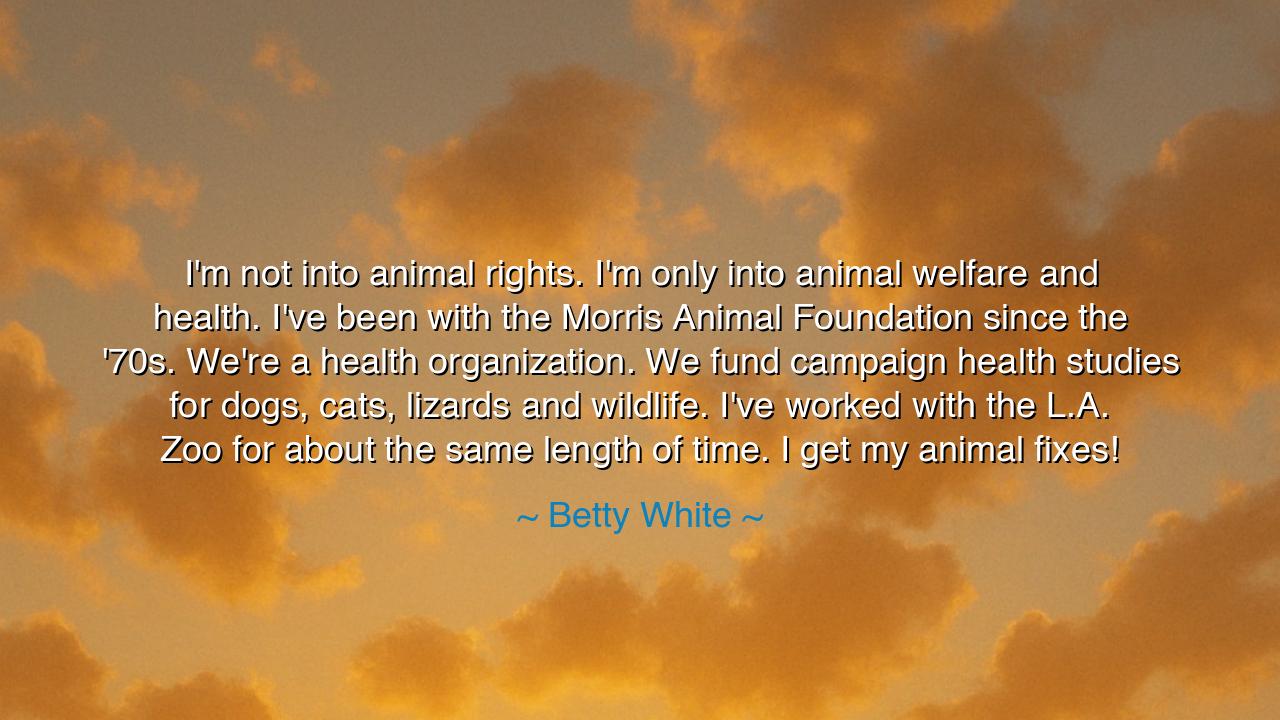
I'm not into animal rights. I'm only into animal welfare and
I'm not into animal rights. I'm only into animal welfare and health. I've been with the Morris Animal Foundation since the '70s. We're a health organization. We fund campaign health studies for dogs, cats, lizards and wildlife. I've worked with the L.A. Zoo for about the same length of time. I get my animal fixes!






The beloved and luminous Betty White, a woman whose heart seemed to hold both laughter and kindness in endless measure, once said: “I'm not into animal rights. I'm only into animal welfare and health. I've been with the Morris Animal Foundation since the '70s. We're a health organization. We fund campaign health studies for dogs, cats, lizards and wildlife. I've worked with the L.A. Zoo for about the same length of time. I get my animal fixes!” These words, simple in their phrasing, carry the weight of a life devoted to compassion—not the loud, fleeting kind that shouts for recognition, but the steady, enduring kind that builds, heals, and nurtures. In them lies a truth that the ancients themselves would have recognized: that true love for creation is not proclaimed—it is practiced.
In the ancient world, wise men and women understood that humanity’s relationship with the animals of the earth was sacred. The Egyptians honored the cat as a guardian of home and harvest; the Greeks told of Artemis, the protector of the wild; and the Native peoples of the Americas spoke of the wolf and the eagle as teachers and kin. To care for animals was not to elevate them above mankind, but to live in balance with all that breathes beneath the same sun. Betty White, in her gentle wisdom, carried this ancient understanding into the modern age. Her devotion was not born of ideology or protest, but of quiet stewardship—the act of tending to life because life itself is holy.
When she spoke of animal welfare rather than animal rights, her meaning was clear. Rights are words written in law, but welfare is written in the heart. Rights demand recognition; welfare demands responsibility. In championing health and care, she placed her faith not in the battle of politics, but in the healing power of compassion. Through her long partnership with the Morris Animal Foundation and the L.A. Zoo, she chose a path of action over argument. Her life became a bridge between human and creature—a living testament to the belief that kindness, when sustained by effort, becomes a legacy.
Consider the story of Dr. Jane Goodall, who journeyed into the forests of Tanzania to study chimpanzees. Like White, she did not shout her love for animals; she lived it. Her compassion took the form of endurance—decades of observation, understanding, and advocacy grounded in respect rather than dominance. From her patience emerged a revelation: that the animals we often see as lesser are bound to us by the same threads of emotion, family, and care. Betty White, in her own realm of celebrity and influence, lived the same truth. Where Goodall watched with reverence, White acted with warmth—raising awareness, funding research, and spreading joy to remind the world that to love animals is to honor life itself.
In this, Betty White’s philosophy stands apart from extremes. She did not seek to divide mankind from its dominion over nature, nor to glorify humanity’s control. Instead, she spoke of balance—a harmony between caring and coexisting, between science and sympathy. The welfare she championed was rooted in realism: that animals, like humans, need medicine, research, and protection, not rhetoric. Hers was a love expressed through the tangible—the feeding of creatures, the funding of studies, the tending of habitats. This is the kind of compassion that endures when words fade.
The ancients would have called her work sacred duty. For to nurture the living earth is to participate in creation itself. Each act of care ripples outward like light across still water. A dog healed of illness, a bird freed from harm, a species protected from extinction—these are miracles born not of divine intervention, but of human hands guided by love. White’s humor, her optimism, and her humility made her message all the more powerful: that kindness need not be grand to be meaningful. Every small act of care adds to the great balance of the world.
And so, let the lesson of Betty White be remembered: true compassion is not loud, but steadfast. Do not measure your love for the living world by words or slogans; measure it by what you heal, what you preserve, and what you nurture. Feed a stray animal. Support the shelters and sanctuaries that guard the voiceless. Teach your children that every creature has a purpose, and that to protect them is to protect ourselves. For in the end, as White knew, our world’s beauty does not come from power or wealth, but from the gentle hands that care for it.
Thus, her words become both a teaching and a blessing: that joy and compassion are not opposites but companions, that laughter and love can dwell together in the same soul. Betty White found her “animal fixes” not in ownership or control, but in communion—a connection as ancient as humankind itself. And through her, we are reminded that to tend the living is to keep the flame of creation burning bright, so that every heart—human or beast—may know the peace that comes from being cherished.






AAdministratorAdministrator
Welcome, honored guests. Please leave a comment, we will respond soon